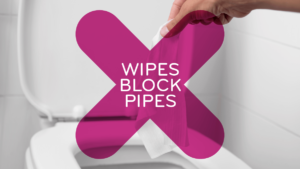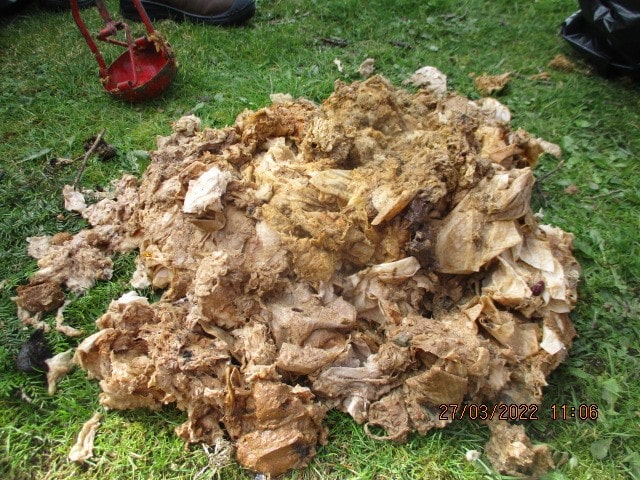
- Research shows that 22% of people in Wales admit to flushing wet wipes down the toilet
- This is despite an overwhelming majority of people from Wales saying they care about protecting the environment 91%, pollution of rivers and seas 92%, and protecting animals 94%
- Wet wipes are the single biggest cause of fatbergs that block sewage systems, and are a major contributor towards littering in rivers
- Welsh Water is urging the public to “Stop the Block” by binning wipes and other sanitary products.

A survey by Water UK has revealed that over a fifth (22%) of people in Wales admit to flushing wet wipes down the toilet.
This is despite an overwhelming majority of people from Wales saying they care about protecting the environment (91%), pollution of rivers and seas (92%), and protecting animals (94%).
Flushed wet wipes can cause huge environmental harm and are one of the leading causes of ‘fatbergs’ that block sewers and cause homes and businesses to flood. There are approximately 300,000 sewer blockages a year across the UK, costing the water industry around £100 million.

They are also a major cause of pollution in our seas and harm wildlife by become trapped inside animals, leading to starvation and ultimately killing them.
Delme Williams, Business Improvement Lead from Welsh Water said: “At Welsh Water we work 24 hours a day, 7 days a week, to deliver over 800 million litres of clean, safe drinking water every day. Every year, we clear hundreds of thousands of blockages from our sewers caused by items that can’t be flushed, such as nappies, wet wipes, sanitary products and more.”
Around 90% of wet wipes contain some sort of plastic. This means that unlike toilet paper, they don’t break down in sewers. Instead, they can get stuck and become one of the main ingredients of the “fatbergs” that block sewers, leading to pollution and flooding. Sewer blockages also mean that storm overflows need to be used more often, leading to pollution in rivers.
And if they make it past the fatbergs, wipes can wash out into the environment, spreading polluting plastics into rivers onto beaches, and endangering wildlife.
Delme Williams, Business Improvement Lead at Welsh Water added: “It’s disappointing to learn that, in a survey carried out by Welsh Water, our customers who are likely to flush harmful wipes down the toilet has risen by 66% in the past four months, compared to July – October 2022.
“Our Stop the Block campaign seeks to educate people in Wales about the issues that flushing the wrong things down the toilet can cause, and to inspire them to properly dispose of products to avoid nasty blockages that are harmful to homes and the environment.”
Customers should remember to only flush the three Ps – pee, poo and paper – to prevent nasty blockages that could flood homes, businesses and gardens.
Recently, Welsh Water colleagues visited Cardigan and St Dogmaels to talk to the public about how to prevent blockages.
The team will be out again in Aberaeron Town Centre from 10am-1pm on Monday 26 June and will be giving advice on how to easily look after your pipes to prevent blockages and floods.
For more information visit dwrcymru.com/stoptheblock
Help keep news FREE for our readers
Supporting your local community newspaper/online news outlet is crucial now more than ever. If you believe in independent journalism, then consider making a valuable contribution by making a one-time or monthly donation. We operate in rural areas where providing unbiased news can be challenging. Read More About Supporting The West Wales Chronicle





















